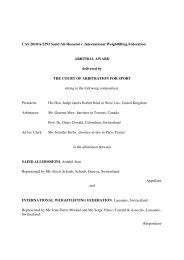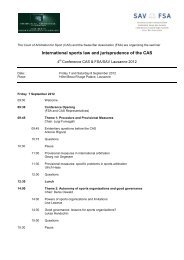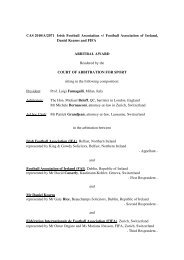(CAS) Bulletin - Tribunal Arbitral du Sport / TAS
(CAS) Bulletin - Tribunal Arbitral du Sport / TAS
(CAS) Bulletin - Tribunal Arbitral du Sport / TAS
You also want an ePaper? Increase the reach of your titles
YUMPU automatically turns print PDFs into web optimized ePapers that Google loves.
Finally, in the absence of other decisive elements, the<br />
language of the proce<strong>du</strong>re remains the one in which<br />
the Appellant drafted his statement of appeal /appeal<br />
brief /claim (the language in which the Appellant<br />
initiated the proce<strong>du</strong>re 32 . In <strong>TAS</strong> 2006/A/1163 the<br />
Appellant sent his statement of appeal/ appeal brief in<br />
French, and the Respondent (a federation) asked that<br />
English be chosen as the language of the proce<strong>du</strong>re.<br />
However, the President of the Appeals Division<br />
noted that the federation in question had English and<br />
French as offi cial languages and the disputed event<br />
(i.e. a world championship) had taken place in France;<br />
therefore, in the absence of other decisive elements in<br />
favour of the one or the other offi cial language, the<br />
President decided to apply the language in which the<br />
Appellant initiated the proce<strong>du</strong>re.<br />
3. Citizenship, mother tongue of the parties and<br />
language of the parties’ counsel<br />
In <strong>CAS</strong> 2008/A/1630, the Appellant (a French<br />
citizen) sent the statement of appeal in French. In a<br />
letter sent to the <strong>CAS</strong> some days after his statement<br />
of appeal, the Appellant argued that French should<br />
be chosen as the language of the proce<strong>du</strong>re, since<br />
French is one of the offi cial languages of the <strong>CAS</strong>, and<br />
that none of the two <strong>CAS</strong> offi cial languages should<br />
a priori be favoured before <strong>CAS</strong> ; the particular case<br />
concerned a French citizen (the Appellant), who lived<br />
in France and had very little knowledge of English:<br />
the Appellant should therefore be able to con<strong>du</strong>ct his<br />
defence in French, in his mother tongue, in order to<br />
better defend his rights, whereas the choice of English<br />
could be detrimental to the Appellant; another<br />
argument in favour of French being chosen as the<br />
language of the proce<strong>du</strong>re was that the Arbitrator<br />
who had been appointed was a French citizen.<br />
However, the Respondent asked that English be<br />
chosen as the language of the proceedings, since<br />
this is the offi cial language of the Federation, and<br />
the applicable rules were drafted in English. An<br />
additional argument in favour of English was that<br />
the proceedings before the fi rst-instance body were<br />
con<strong>du</strong>cted in English, counsel representing the<br />
Federation did not speak French and the exhibits<br />
submitted by the Appellant were in their majority<br />
in English; the Appellant further supported that<br />
translation of all documents drafted in English<br />
would constitute an excessive burden and expense on<br />
the Federation; fi nally, if the Appellant needed the<br />
assistance of an interpreter <strong>du</strong>ring the hearing, the<br />
Federation would be ready to bear the relevant costs.<br />
32. See <strong>TAS</strong> 2006/A/1163, order on language issued on 2 November<br />
2006.<br />
In his Order on language issued on 15 August 2008,<br />
the Deputy President of the Appeals Arbitration<br />
Division decided that English should be used as the<br />
language of the proce<strong>du</strong>re; the citizenship and the<br />
mother tongue of the Appellant do not constitute<br />
key elements regarding the choice of the language of<br />
arbitration, whereas proceedings before <strong>CAS</strong> may be<br />
con<strong>du</strong>cted in a language which may not necessarily<br />
be the one of the country of the Appellant 33 . The<br />
fact that the Appellant has not a good command<br />
in English is not a decisive element either,<br />
especially when the parties do not have a common<br />
language 34 . Furthermore, as it was also found in <strong>TAS</strong><br />
2006/A/1163, the language of party’s counsel is not a<br />
decisive element for the language of the proce<strong>du</strong>re 35 .<br />
As to the argument of fair trial, the Deputy President<br />
held that this fails if the Appellant is assisted by a<br />
lawyer having a good command in the language of<br />
the proce<strong>du</strong>re and/or an interpreter. The Deputy<br />
President considered that the fact that the fi rstinstance<br />
proceedings were con<strong>du</strong>cted in English and<br />
the challenged decision was in English played an<br />
important role and concluded that English should be<br />
selected as language of the proce<strong>du</strong>re. Consequently,<br />
according to the letter of Article R29 <strong>CAS</strong> Code,<br />
there is no right of the athlete to use his own mother<br />
tongue but there has to be an agreement between the<br />
parties and the Panel has the prerogative to decide<br />
according to the circumstances.<br />
C. Acceptance of more than one languages<br />
by the <strong>CAS</strong> panel<br />
In some cases, although there is only one “ offi cial ”<br />
language chosen by the President of the relevant<br />
Division of <strong>CAS</strong>, the parties are allowed to bring<br />
their documents in another language without having<br />
to translate them, or can express themselves orally in<br />
another language 36 . This happens mostly when the<br />
appointed Arbitrators have a good command in both<br />
languages chosen with a view to gaining time and<br />
re<strong>du</strong>ce additional costs that would have to be borne<br />
by the parties. The consent of the parties also plays a<br />
role in this respect: In <strong>CAS</strong> 2008/A/1564, “The hearing<br />
was con<strong>du</strong>cted in English, but the panel, with the consent of the<br />
parties, allowed fl exibly for the use of German, where a person<br />
could not express him/herself in English”.<br />
33. <strong>CAS</strong> 2010/A/2306, order of 28 December 2010.<br />
34. <strong>CAS</strong> 2009/A/1975, order on language of 18 November 2009.<br />
35. <strong>TAS</strong> 2006/A/1163, order on language of 13 May 2009.<br />
36. See also <strong>TAS</strong> 2006/A/1095 mentioned above.<br />
Articles et commentaires / Articles and commentaries<br />
-<br />
44





